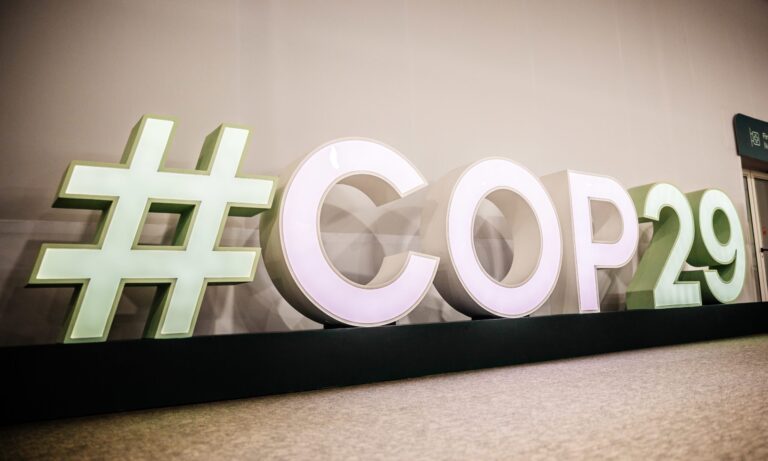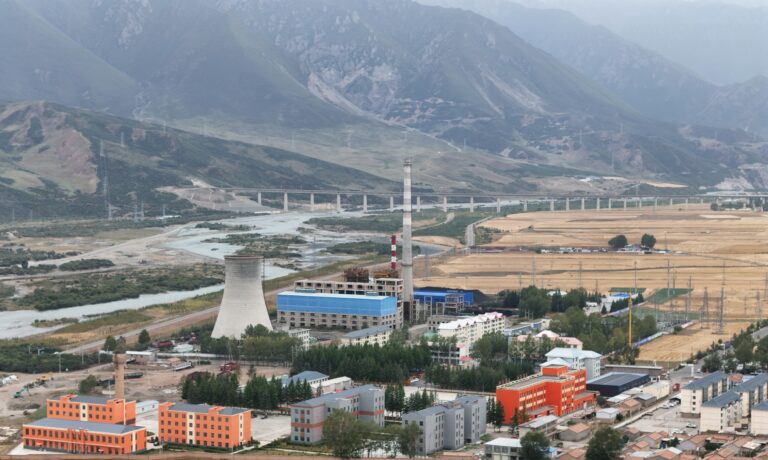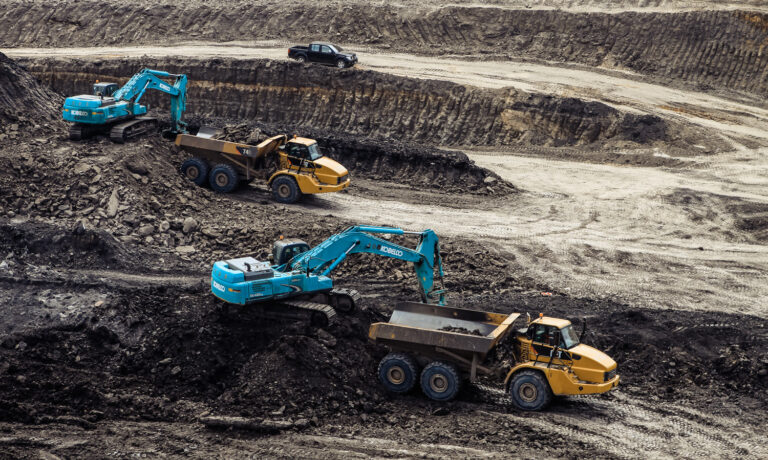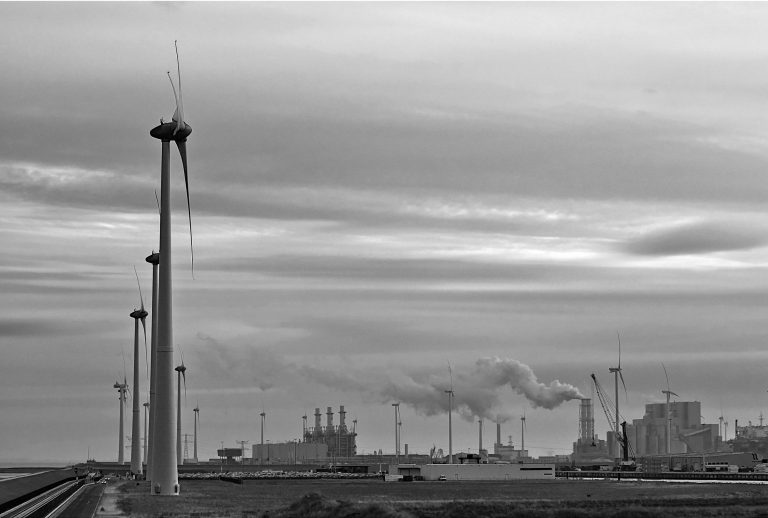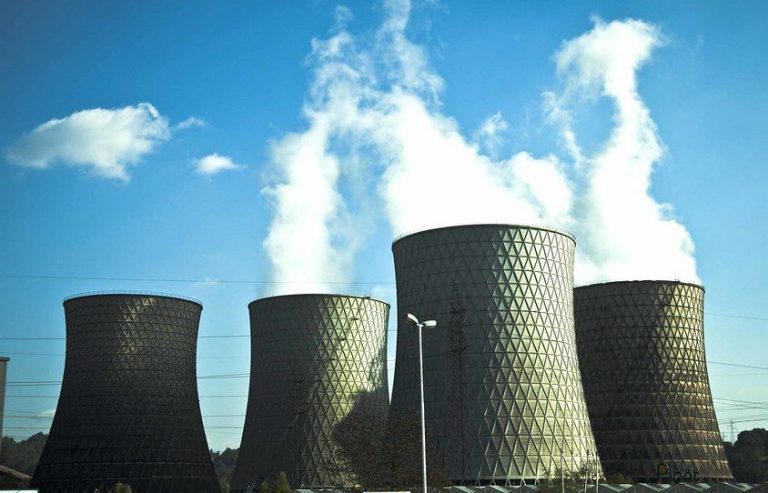#climate
COP29 and Beyond: Is China Holding the Trump Card?
“Shameful COP29 climate talks,” “frantic diplomacy,” “a staggering betrayal of the world’s most vulnerable,” and “a deal that very nearly never was.” Views on the outcome of the 29th Conference of the Parties to…
How China Completely Redefined a Key Energy Target
Shifting the meaning of “energy intensity” may affect the realization of China’s 2025 carbon intensity goal.
China’s Emission Trading System Leaves a Lot to Desire
China needs to step up ambitions on its emission trading trading system to contribute to global decarbonization efforts.
Climate Diplomacy in Turbulent Times: EU and China Re-Engage
The EU needs to shape the current phase of re-engagement with China by adjusting its approach to environment and climate cooperation on two fundamental levels. Moving away from dialogue for the sake of dialogue, the EU Commission has to consider the different political perceptions of climate cooperation and pursue a more stakeholder-centric approach with China.
EU-China relations have seen a rough few years with China’s inward-turn during the time of COVID-19, and economic competition and political tensions increasing. Ties in most areas of the relationship have been interrupted, with communication in several issue areas coming to a halt. In this situation, EU policymakers have started to see environment and climate as the partnership topic in their relations with China. As a major issue of common interest, it is often viewed as a useful means to keeping dialogue channels open.
Therefore, in the past few COVID-affected years, meetings on environmental and climate matters have mostly served as a platform for engagement, without necessarily expecting concrete results. Even when environment and climate were not to be the main focus of EU-China meetings, these issues were elevated on the agenda to balance the contentious trade and political issues. The same logic appears set to guide the upcoming EU-China summit in early December.
One persistent concern in the EU regarding climate engagement with China is striking the right balance between cooperation and competition. While the EU appears inclined towards a cooperative stance, it is concurrently engaged in heated competition with China, as exemplified by its recent anti-subsidy investigation into Chinese electric vehicle imports, just as China has restricted key electric vehicle battery component exports. This state of competition and simultaneous cooperation will remain a key feature of the EU-China climate relationship.
EU-China Climate Dialogue and its Results
Within the various EU-China forums and platforms through which climate engagement takes place – both informal and formal – cooperation appears to work better through some channels than others. Currently, the most important dialogue on environment and climate is the High-Level Environment and Climate Dialogue (HECD), as it features the highest-ranking representatives from the two sides.
The fourth HECD took place in July and does not appear to have brought many deliverables apart from defining “avenues for cooperation.” A question remains as to what has become of the outcomes of the three dialogues in previous years. An EU official involved in the talks pointed out that between the third HECD in 2022 and the fourth one this year, the EU and China had agreed to convene technical cooperation formats in which bilateral expert groups would address issues such as methane emissions reductions. There have been delays in follow-up discussions. On the EU’s side, it is assumed that these are linked to the late adoption of China’s Methane Emissions Action Plan.
Whatever may have led to other commitments made during previous dialogues not being implemented, a note at the top of the Joint Press Release of this year’s HECD gave reason to hope for more concrete results in the negotiations to come: “Both sides fully recognized that the HECD must continue to achieve practical results.”
We have already seen some follow-up dialogues, which is a welcome sign. However, it was noticeable that the press release appeared more than three weeks after the meeting was convened. This begs the question as to why it took so long to reach an agreement that only had little substance.
What Needs to Be Done
To make the cooperation with China on climate and environment in the current phase of re-engagement more meaningful, the EU needs to adjust its approach on two fundamental levels.
First, the EU has to consider the divergent political perceptions of climate cooperation. Climate and environment have a different place on China and the EU’s list of priorities and in relation to other aspects of their relationship. On the EU side, climate is high up on the agenda, and Brussels is trying to treat climate independently of other topics in the relationship such as trade or politics.
Meanwhile, China views climate issues as just one facet of its foreign engagement, often downplaying their significance in favor of other priorities. Chinese representatives’ recent messaging at conferences like the G20, the United Nations General Assembly, and BRICS signaled that. Notably, the Chinese leadership prioritizes development overall above climate. Xia Yingxian, the head of China’s Ministry of Ecology and Environment’s (MEE) climate office and the incoming successor to climate envoy Xie Zhenhua, stressed the importance of respecting “different starting points and national conditions of each country.” Xia made this point on prioritizing development even more clear by stating that “COP28 should promote effective coordination between addressing climate change and poverty eradication, energy security, job creation, economic development and other needs.”
Furthermore, China’s integrated approach toward climate cooperation is evident in that it does not isolate climate from tense political relations and other areas. The Chinese Ambassador to the EU, Fu Cong, made this point clear: “Global climate governance does not happen in a vacuum. One should not seek political confrontation on the one hand and expect unconditional cooperation on the other. ” This approach stands quite in contrast to China’s relatively far-sighted thinking in other areas. Tying political tensions to joint climate action neglects the fact that global climate change does not halt on account of bilateral political frictions. Both sides are likely going to face even more severe consequences if they do not find a joint path forward. EU stakeholders need to keep this different perception in mind when negotiating with China on climate issues.
Additionally, Xi Jinping confirmed in July what has already been evident when observing Chinese behavior in the climate sphere over the last few years: China intends to advance toward carbon neutrality in a self-determined way, and the path will “never be influenced by others.” Some in the EU seem to have internalized the reality that China is moving at its own pace when it comes to its climate action while others still think that the EU or other partners can push Beijing to increase its ambition.
Second, Chinese government and party politics seemingly continue to be a black box, therefore the EU should put more emphasis on stakeholder-centric engagement with China.. Frequent institutional reshuffles – the last one took place in March 2023 – may be one reason for the continued lack of understanding of Chinese decision-making processes. The higher the political rank of the government official, the more leeway for decisions foreign partners such as the EU can expect in dialogues.
As a solution, the EU could adapt its approach to climate cooperation, moving beyond the more or less successful cooperation with China in technical areas (e.g. methane, target setting, etc.) and towards an additional focus on stakeholder-centric engagement. Ahead of climate dialogues, it is crucial for the EU to involve the right institutions and government representatives, a practice that currently seems inconsistent, in order to better grasp China’s decision-making processes and responsibilities. This adjustment, while not radical, is crucial. Technical cooperation, where the EU excels, no doubt remains important. However, investing that extra time in coordination and not agreeing to dialogues just for the sake of dialogue, may expedite climate negotiations and lead to more concrete outcomes.
China and the EU as Joint Climate Forerunners?
While the US and China’s involvement is crucial for significant climate progress – not only at the upcoming COP28, but beyond – with its normative power, the EU also plays a vital and consistent role in global climate action. It remains unclear whether the US will stay on the same course on climate issues after the US election next year. Research has found that the US retreat from the Paris Agreements during the Trump administration paved the way for increased EU-China interdependence on climate issues. A similar scenario might be replayed.
To ensure positive competition in areas like green technology and resource supply chains, the EU and China must collaborate effectively during the current re-engagement phase. This period offers an opportunity to revamp climate cooperation and set a high benchmark for global climate leadership. However, in order to be successful, the EU has to significantly adapt its approach and make sure it delivers results.
More Renewables, More Coal: Where Are China’s Emissions Really Headed?
China’s emissions will peak when clean energy growth overtakes energy demand growth. This may happen in 2024.
Why Electric Vehicles Could Drive China’s Carbon Pledge to Success
As the COP27 approaches in Sharm El-Sheik, China is once more expected to be in the spotlight. When it comes to decarbonization, China has preferred to carve its own path, and the electric vehicle sector is no exception. Carefully balanced on the peak between economic and environmental development, the sector could become the driver of its decarbonization process.
Climate Engagement with China: A Litmus Test for Germany’s G7 Presidency
The Russian invasion of Ukraine is shaking up the very foundations of the international system, making crucial multilateral and plurilateral fora such as the G20 nonfunctional in tackling continuing fundamental crises, including climate change.…
Why Berlin Must Handle its Economic Dependency on China
This article is part of a series of articles authored by young, aspiring China scholars under the Future CHOICE initiative. Germany’s economic vulnerability with regard to China is growing at the same moment that Russia’s…
High Ambitions But No Teeth in China’s Environmental Guidelines for Investing Abroad
As Chinese foreign direct investment (FDI) has increased rapidly throughout the years, so has Chinese companies’ environmental footprint around the globe. Energy, mining, and construction companies are the usual suspects, but heavy industries have…
Watchdogs Detail Damage Done by China in the Western Balkans
Construction of the Bar – Boljare highway in Montenegro by China’s China Road and Bridge Corporation (CRBC) has brought irreversible damage to the UNESCO-protected Tara River. Known as the “Tear of Europe”, its riverbanks…
Voice for CHOICE Special Edition: Double Episode on Environmental and Climate Issues
As both the EU-China CAI 17+1 summit begin to fade from view and more challenges yet emerge for China and their relations with both the EU and CEE nations, the Voice for CHOICE podcast is picking up on one of China’s evermore present promises in such high-profile meetings and agreements in 2021, that of climate cooperation
China’s Environmental Footprint in Southeast Europe
In 2009, China’s leadership of a group of developing nations that opposed ambitious commitments to fight climate change led to the failure of the United Nations Climate Change Conference held in Copenhagen. Just over…
